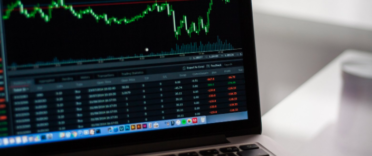![]() In this article, we explain the cheapest way to buy a FTSE 100 index tracker fund. We look at the cheapest funds as well as the cheapest platforms to use. We also explain the things you should bear in mind when investing in a FTSE 100 tracker fund.
In this article, we explain the cheapest way to buy a FTSE 100 index tracker fund. We look at the cheapest funds as well as the cheapest platforms to use. We also explain the things you should bear in mind when investing in a FTSE 100 tracker fund.
What is an index tracker fund and how does it work?
Tracker funds are investment funds that track the movement of a market index, such as the FTSE 100. So when an index rises, the value of your fund rises and conversely when the index falls, your investment in the fund falls. Tracker funds are low-cost investment options and enable you to diversify your portfolio over different asset types and countries.
There is at least one index for each global stock market, for instance, the FTSE 100 index represents the 100 biggest companies on the UK stock market while the FTSE All-Share index represents all the companies listed on the UK stock market.
How do index tracker funds track an index?
Most trackers mimic the performance of an index in one of two ways:
Full replication
This method is where the fund actually buys shares in all companies within an index. So a FTSE 100 index tracker fund using the full replication method will buy shares in all 100 companies in the index in proportion to the size of the companies within the index. Using the full replication method means that funds mirror the index as closely as possible (i.e. have a small tracking error).
Partial replication
This method is often used when it is difficult to buy all the shares in an index. A fund will instead invest in a sample of an index that represents the whole index. When an index has a large number of companies, the time and cost it would take to hold all the companies in the index would be detrimental to the value of the portfolio.
How does a tracker fund differ from an ETF?
An index tracker fund is a fund that you can invest in the same way you would a normal investment. The price changes daily and reflects the value of the assets it holds.
An Exchange Traded Fund (ETF), is traded on the stock market and bought and sold in the same way that you would buy and sell shares. Prices change throughout the day, so investors get a set price that should reflect the underlying index at the point that they buy or sell.
What to consider before buying an index tracker fund
A FTSE 100 index tracker, for example, simply reflects the fortunes of the FTSE 100 index so that when the index rises an investor will benefit but when the FTSE 100 falls the value of their investment falls as well.
Tracker funds are what is known as a passive investment so they will slavishly follow an index and can suffer disproportionately if a particular sector that makes up a large part of the index goes through a downturn.
Conversely, actively managed funds, run by a fund manager, will typically buy stocks that they believe will do much better than the index and will have much more freedom in creating their portfolios. This means that in theory, actively managed funds can react quicker to a poor investment environment than a tracker fund. However, if an actively managed fund makes some poor investment choices then the results can be catastrophic as we have seen in the past.
Tracker funds are generally cheaper than actively managed funds and when investing for the long term this can make a sizeable difference to the overall investment performance. Research shows that over the long term active fund managers seldom outperform passive index funds.
Tracking errors
A tracking error is a measurement of how much the fund in question deviates from the actual index. This tracking error can be caused by fund costs, money flowing in and out of the fund or changes in the constituent shares making up the index. The lower a fund's tracking error the better, as it means it better reflects the performance of the relevant index it is tracking.
The cheapest way to invest in a FTSE 100 index tracker fund
As stated earlier investing in index tracker funds is cheaper than investing in actively managed funds due to the additional management required with an actively managed fund. Index tracker funds are passive and usually managed automatically by computers. Most investors use a tracker fund as a long term 'buy and hold' investment, so switching charges are less relevant. When comparing index tracker funds you should compare the Ongoing Charges Figure (OCF) as they differ from fund to fund. This figure represents the total cost of running the fund and includes administrative costs such as maintaining records, producing reports and calculating the daily unit price as well as paying for any research that goes into deciding which assets to buy and sell.
Below I have selected three of the cheapest FTSE 100 tracker funds which have competitive Ongoing Charge Figure's:
Vanguard FTSE 100 Index Unit Trust
- OCF - 0.06%
- No other fees payable
- Tracking error - 0.22
iShares 100 UK Equity Index Fund
- OCF - 0.06%
- No other fees payable
- Tracking error - 0.74
HSBC FTSE 100 (via Hargreaves Lansdown)
- OCF - 0.09%
- No other fees payable
- Tracking error - 0.77
You then need to choose an investment platform through which you can invest in your chosen tracker fund. That means that as well as the ongoing fund charge there will also be a charge from the investment platform that will administer your investments. These platforms have different charges and offer a variety of investment information and tools.
The tables below show some of the most popular and cheapest investment platforms for investing in a FTSE 100 tracker fund using a SIPP or a Stocks and Shares ISA. The tables show the total cost of investing various amounts in the Vanguard FTSE 100 Index Unit Trust over one year in either an ISA (or general investment account) or a SIPP.
Cheapest way to invest in a FTSE 100 tracker within an ISA or General Investment Account
| Investment Platform | Platform Fee per annum | Vanguard OCF fund charge | Annual charge on £10,000 | Annual charge on £25,000 | Annual charge on £50,000 | Annual charge on £100,000 |
Annual charge on £250,000
|
| Hargreaves Lansdown* | 0.45% up to £250,000, 0.25% £250,000 - £1 mill. no fee over £2 mill. | 0.06% | £51 | £127.50 | £255 | £510 | £1,275 |
| Vanguard Investor | 0.15% p.a. up to £250,000 | 0.06% | £21 | £52.50 | £105 | £210 | £525 |
| Interactive Investor* | £9.99 per month flat fee | 0.06% | £125.88 | £134.88 | £149.88 | £179.88 | £269.88 |
| A J Bell* | 0.25% on first £250,000 | 0.06% | £31 | £77.50 | £155 | £310 | £775 |
| Fidelity* | 0.35% - £7,500 or more, 0.20% - £250,000 to 1 mill. | 0.06% | £41 | £102.50 | £205 | £410 | £650 |
Last updated 20th June 2022
Cheapest way to invest in a FTSE 100 tracker within a SIPP / Pension
| Investment Platform |
Platform Fee per annum | Vanguard OCF fund charge | Annual charge on £10,000 | Annual charge on £25,000 | Annual charge on £50,000 | Annual charge on £100,000 |
Annual charge on £250,000
|
| Hargreaves Lansdown* | 0.45% up to £250,000 | 0.06% | £51 | £127.50 | £255 | £510 | £1,275 |
| Vanguard Investor | 0.15% p.a. up to £250,000 | 0.06% | £21 | £52.50 | £105 | £210 | £525 |
| Interactive Investor* | Flat £12.99 per month SIPP fee (Pension Builder plan) | 0.06% | £161.88 | £170.88 | £185.88 | £215.88 | £305.88 |
| A J Bell* | 0.25% on first £250,000 | 0.06% | £31 | £77.50 | £155 | £310 | £775 |
| Fidelity* | 0.35% - up to £249,999, 0.20% - £250,000 to 1 mill. | 0.06% | £41 | £102.50 | £205 | £410 | £650 |
Last updated 20th June 2022
As you can see from the above information the decision you make about which investment platform to use can make a significant difference to your returns over time. Also, many platforms have the same charges for both ISA and SIPP but not all, so it may be cheaper to have your ISA with one platform and your SIPP with another as shown in the above table.
If a link has an * beside it this means that it is an affiliated link. If you go via the link, Money to the Masses may receive a small fee which helps keep Money to the Masses free to use. The following links can be used if you do not wish to help Money to the Masses or take advantage of any exclusive offers - Hargreaves Lansdown, Interactive Investor, AJ Bell, Fidelity




